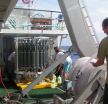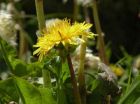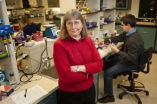(Press-News.org) Composed of diverse elements, mostly of plastic, with little metal used, improvised explosive devices are very difficult to detect. In cooperation with two colombian universities, scientists at EPFL's Electromagnetic Compatibility Laboratory have found a solution. They have developed a device enabling the remote explosion of these mines, by using the energy from their electromagnetic impulses.
This type of mine is often used by guerillas or terrorist groups in conflict zones, and is present in many regions of the world, such as Colombia, Iraq and Afghanistan. They kill or mutilate hundreds of thousands of people every year, mainly civilians. Being themselves Colombian, and hence sensitive to this problem, Félix Vega and Nicolas Mora, doctoral students at EPFL, decide to make this project the subject of their thesis.
The two researchers had to confront two main technical difficulties. Firstly, they had to find a way of inducting a current that would be strong enough to set off, at a distance, the detonators of the mines, sometimes buried deep in the ground. Secondly, they had to be sure of attaining the resonance frequencies of the various types of mines, which are all constructed in different ways.
To scan the highest possible number of frequencies, it's necessary to create short impulses, with a very fast response time. In thus spanning a large spectrum of resonances, "only a fraction of the impulse we create reaches the target, and by then the current is no longer strong enough to explode the mine", explains Professor Farhad Rachidi.
"We then realised that in spite of the wide diversity of these mines, they are however all in similar frequency ranges", adds Nicolas Mora. "So we developed a system that concentrates on those, and thus loses less energy." The Electromagnetic Compatibility Laboratory tested this system in Colombia last November, using actual improvised mines provided by a team of professional bomb disposal experts, which they were able to set off at an average distance of 20 meters.
This achievement is the result of two years of research work: "Now we have to develop a smaller prototype that is weather-resistant and especially easier to transport in the field", notes Félix Vega. "In Colombia, we often have to travel on small country roads."
Scheduled to run for a total of four years, the project has been undertaken with the National University of Colombia and the University of Los Andes.
INFORMATION:
Contact: Professor Farhad Rachidi, Electromagnetic Compatibility Laboratory, +41 76 329 41 07, farhad.rachidi@epfl.ch
END
MIAMI – Feb 15, 2011 – A study by scientists at the University of Miami (UM) Rosenstiel School of Marine & Atmospheric Science suggests a new way to estimate how much of the ocean's pollution is falling from the sky. The new findings can help improve scientific understanding of how toxic airborne chemicals, from the burning of fossil fuels and industrial power plants emissions, are impacting the oceans globally.
By measuring Beryllium-7 (7Be) isotope concentrations in the ocean, which is found naturally throughout Earth's atmosphere, Rosenstiel School scientists David ...
Potholes in the road or a park bench in need of repair – we all come across these or similar problems every now and then. If only there were a simple way of reporting them to the right department of the public administration! The latest mashup technology and mobile applications make it possible to come up with solutions.
Inspired by the UK website www.fixmystreet.com, the Fraunhofer Institute for Open Communication Systems FOKUS in Berlin is taking this approach further. Damage reports can be assigned GPS coordinates by cell phone and entered. The system then provides ...
You might think that a loving partner helps keep you on track—say, when you want to stick to your jogging or concentrate on your studies. But a new study in Psychological Science, a publication of the Association of Psychological Science, reports the opposite: Thinking about the support a significant other offers in pursuing goals can undermine the motivation to work toward those goals—and can increase procrastination before getting down to work.
The study's authors, psychological scientists Gráinne M. Fitzsimons of Duke University and Eli J. Finkel of Northwestern University, ...
The auto industry faces major challenges. New models are entering the market at ever shorter intervals, products are becoming more complex, and the trend towards electric cars requires modified vehicle structures. European production sites are coming under increasing cost pressure from low-wage countries. Cost reductions, shorter production times, new materials and innovative assembly techniques are needed if companies are to remain competitive. To achieve these goals, 23 business and research organizations are participating in the EU's Pegasus project (www.pegasus-eu.net). ...
Just when everyone thought that almost every plant species on the Iberian Peninsula had been discovered, Spanish researchers have discovered Taraxacum decastroi and Taraxacum lacianense, two dandelions from the Pyrenees and the Cordillera Cantábrica mountain range, respectively. This finding confirms Spain's privileged position as a hotbed of biodiversity.
"It's hard to find new species now in Spain. It depends on the complexity of the group of plants you study", Antonio Galán de Mera, lead author of the study and a researcher in the Department of Biology (Botany) at ...
WASHINGTON – A National Research Council committee asked to examine the scientific approaches used and conclusions reached by the Federal Bureau of Investigation during its investigation of the 2001 Bacillus anthracis mailings has determined that it is not possible to reach a definitive conclusion about the origins of the anthrax in letters mailed to New York City and Washington, D.C., based solely on the available scientific evidence.
Findings of the committee's study include:
The FBI correctly identified the dominant organism found in the letters as the Ames strain ...
Someday, that potted palm in your living room might go from green to white, alerting you to a variety of nasty contaminants in the air, perhaps even explosives.
The stuff of science fiction you say? Not so, says a Colorado State University biologist whose research is funded in part by Homeland Security's Science and Technology Directorate (DHS S&T), as well as by the Defense Advanced Research Projects Agency (DARPA), the Office of Naval Research (ONR), and others.
Dr. June Medford and her team in the Department of Biology at Colorado State have shown that plants ...
Interactions between proteins are of fundamental importance for a number of processes in virtually every living cell. However, in order for the proteins to carry out any biological function, they must first assume their specific three-dimensional shape. A number of reactions have been described in recent years, where one of the interaction partners does not assume its active structure until the actual binding process commences. It was still a great mystery, though, how the binding partners could actually recognize such unstructured proteins.
Scientists led by Professor ...
Boston, MA – An estimated 10 million Americans suffer from knee osteoarthritis (OA), making it one of the most common causes of disability in the US. Due to obesity and symptomatic knee OA, Americans over the age of 50 will together lose the equivalent of 86 million healthy years of life, concluded researchers at Brigham and Women's Hospital (BWH), who investigated the potential gains in quality and quantity of life that could be achieved averting losses due to obesity and knee OA. These findings are published in the February 15 issue of Annals of Internal Medicine.
"Reducing ...
While governments debate about potential policies that might curb the emission of greenhouse gases, new University of Washington research shows that the world is already committed to a warmer climate because of emissions that have occurred up to now.
There would continue to be warming even if the most stringent policy proposals were adopted, because there still would be some emission of heat-trapping greenhouse gases such as carbon dioxide and methane. But the new research shows that even if all emissions were stopped now, temperatures would remain higher than pre-Industrial ...




